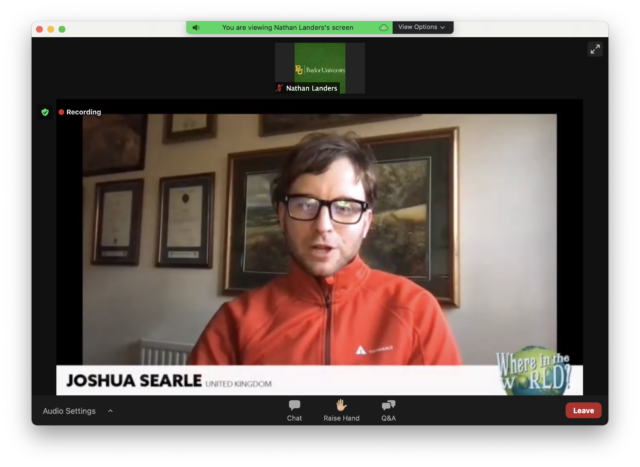By Vivian Roach | Desk Editor
The first of two Zoom panel discussions, titled “Where in the World?” took place on Tuesday afternoon as a panel of political researchers discussed the repeating of history they are seeing in current religious, political and societal issues around the world.
Nine researchers participated in the panel put on by the Keston Center for Religion, Politics and Society in the Baylor University Libraries’ Special Collections. The Center houses a library and archive of materials on religious persecution under communist and totalitarian regimes.
The discussion was held virtually all over the world, with researchers from the Ukraine, United Kingdom, Russia, France, Romania, Armenia and the U.S. Each researcher submitted a short report about recent research on their respective countries.
They spoke to the state of the pandemic and how it has affected their work.
Additionally, several of the researchers pointed to examples of “history repeating itself” in current events centered around Christianity in the United Kingdom and Russian politics and society reflecting times before the collapse of communism in 1991.
Kathy Hillman, director of the Keston Center and professor at Baylor, said she hoped students took away a valuable lesson from the discussion.
“I want them to understand how the past affects the present and then to know what is going on in the world related to religion, politics and society today,” Hillman said.
One panelist, Dr. Emily Baren from Middle Tennessee State University, is studying what’s happening with Jehovah’s Witnesses in Russia as part of her research. She said in the last three to four years they’ve been treated similarly to extremist groups like Al Queda as they are barred from legal faith practice in Russia.
“1991 [communism] collapse didn’t mean a complete break from the past,” Baren said.
Some of the researchers have their own history with religious persecution, Hillman said. Dr. Mykhailo Cherenkov from Ukraine is the son of unregistered Baptists who were imprisoned for their faith. He said some about his story and what it is like today.
Findings in their studies were made possible because of the Keston Center’s collection of materials. Dr. Artyom Tonoyan, a University of Minnesota research associate, praised the availability of primary sources in the collection that can’t be found anywhere else.
For an example, Hillman said they have a trial transcript of someone arrested for distributing Christmas cards.
“Her trial transcript when she was sent to prison is written in ballpoint pen on strips of bed sheets [that] then was smuggled out by being wrapped around the midriffs of individuals,” Hillman said.
Baylor was interested in the entire collection.
“So in 2007 there was an agreement between Baylor and the Keston Institute for Baylor to create the Keston Center for Religion, Politics and Society,” Hillman said. “That would house the archives, make them available for research, hold lectures and symposia that would help disseminate research on the area.”
The collection was originally located at Keston College in Oxford, England and is the world’s most comprehensive artificially assembled collection on this matter, the Baylor Keston Center webpage said.
There will be a second panel session 11 a.m., Friday, March 26 to include additional international researchers.



